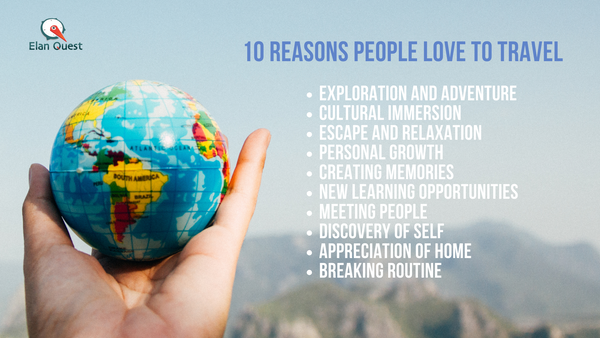Have you ever daydreamed about going on a trip to explore culture, experience food, and just get lost in adventure?
Without a doubt, travel can stir anyone’s heart. The beauty of travel is undeniably amazing; no wonder people love traveling!
In this blog series, we’re going to dive further into traveling. We’ll discuss the various types of travel experiences, uncover reasons why people love pursuing traveling, and discover what is the purpose of travel.
So fasten your seatbelt because we’re about to rediscover how wanderlust meets purpose!
What Is The Purpose Of Travel?

The purpose of travel is multifaceted, and it can vary significantly from one individual to another. Here are some of the key purposes and motivations behind travel:
Exploration And Discovery
Many people travel to explore new places, cultures, and experiences. It's a way to satisfy one's curiosity, learn about the world, and gain a broader perspective on life.
Adventure
Travel often offers the opportunity to engage in adventurous activities like hiking, diving, or extreme sports. For some, the thrill of adventure is a primary motivation.
Relaxation And Escapism
Travel can be a means of relaxation and escape from the routine and stress of daily life. Vacationing in beautiful and tranquil destinations allows people to recharge and rejuvenate.
Cultural Immersion
Travel allows one to immerse oneself in different cultures, learn about local traditions, taste new foods, interact with people from diverse backgrounds and experience the brotherhood and sisterhood of humanity.
Personal Growth
Travel can be a transformative experience, pushing individuals out of their comfort zones, fostering self-reliance, and promoting personal development. It can also help build confidence and resilience.
Reconnecting With Nature
Some travel to reconnect with nature, whether visiting a remote beach, a national park, wildlife reserve or a mountain retreat. Nature-focused travel can be spiritually fulfilling.
Building Relationships
Travel often involves spending quality time with family and friends. It's an opportunity to create lasting memories and strengthen bonds with loved ones.
Education
Travel provides an education that goes beyond what textbooks can offer. It's a firsthand learning experience that can teach history, geography, anthropology, and more.
Business And Career
Travel is essential for many professions, including sales, diplomacy, and journalism. It allows professionals to conduct business, network, and build connections globally.
Volunteerism And Humanitarian Work
Some people travel to make a positive impact by volunteering in needy communities. It's a way to give back and contribute to the betterment of society.
Celebration
Travel can be a way to mark special occasions such as weddings, anniversaries, or milestone birthdays. It adds a layer of excitement and significance to these events.
Fulfilling Bucket Lists
Many individuals have a list of places they dream of visiting and experiences they want to have. Travel helps them fulfill these aspirations.
In essence, the purpose of travel is a personal and subjective matter. It can encompass a range of motivations, from the desire for relaxation to a thirst for adventure, a quest for self-discovery, or the pursuit of new knowledge and experiences.
Travel's ability to fulfill various purposes simultaneously makes it captivating, providing each traveler with a unique and enriching experience.
What Are The Types Of Travel?

Travel comes in various forms, and the types of travel can be categorized based on different criteria, such as purpose, mode of transportation, duration, and style. Here are some common types of travel:
Leisure Travel
This is the most common type of travel and includes vacations and holidays. It's for relaxation and enjoyment and often involves visiting new destinations for sightseeing, recreation, and cultural experiences.
Business Travel
Business travelers journey for work-related purposes. This may include attending meetings, conferences, trade shows, or client visits. The primary focus is on business activities.
Adventure Travel
Adventure travelers seek adrenaline-pumping experiences such as hiking, trekking, rock climbing, biking, or extreme sports. The goal is to challenge oneself and explore nature in unconventional ways.
Solo Travel
Solo travelers journey alone. This type of travel provides a sense of independence, self-discovery, and the opportunity to meet new people.
Group Travel
Group travel involves traveling with a pre-arranged group of people, often for a specific purpose, like guided tours, school trips, or group holidays.
Cultural Travel
Cultural travelers are interested in experiencing and learning about a place's customs, traditions, and history. This type of travel often involves visiting museums, historic sites, and local festivals.
Eco-Tourism
Eco-tourists travel with a focus on minimizing their environmental impact. They visit ecologically sensitive areas, engage in sustainable practices, and support conservation efforts and local businesses.
Fun Fact: Did you know that three years after the global pandemic started, the tourism industry is doing really well? People are trying to make up for lost time by traveling, and a new type of traveler has appeared. These travelers care a lot about the environment and being ethical in their choices. In fact, 69% of tourists are planning to travel in a way that's good for the planet in 2023.
This change in thinking is happening just when it's crucial to travel responsibly. Whether it's using less energy or respecting the culture of the places you visit, being sustainable is not just a choice anymore; it's a must. It will affect our society and the vacation rental industry in the years to come.
Medical Tourism
Medical tourists travel to other countries for medical treatments or surgeries. This can be due to the availability of specialized procedures, lower costs, or shorter wait times.
Fun Fact: Did you know that in 2023, Europe was the top destination for medical tourism, capturing over 60% of the market. Italy and Spain were the leaders in this field.
Europe is expected to stay at the forefront of medical tourism until 2027, with a growth rate of over 10% from 2023 to 2027. Europe's advanced healthcare, skilled doctors, and English-speaking staff make it an attractive choice for medical tourists.
Government rules and incentives play a significant role. For example, India has a National Medical & Wellness Tourism Board, and there's an E-Medical visa for 166 countries. Turkey even offers discounts for medical tourism marketing.
Rising healthcare costs in the US and China are driving more people to seek treatment abroad. In the US, a procedure can cost $47,000, while it's $12,000 in Mexico. This cost difference makes medical tourism an affordable option.
Medical tourism is also about getting treatments that might not be available in your home country due to legal or ethical reasons. For example, fertility treatment regulations vary, so some patients go to countries where it's allowed.
Volunteer Travel
Volunteer travelers work in various locations, contributing to community development, conservation efforts, or humanitarian causes.
Educational Travel
Educational travelers travel to gain knowledge and learn new skills. This might involve attending language schools, workshops, or courses in foreign countries.
Religious Pilgrimage
People undertake religious travel to visit holy sites, shrines, and places of worship significant to their faith. It's a spiritual journey aimed at deepening one's religious connection.
Fun Fact: Did you know that, according to the UN World Tourism Organization (UNWTO), about 300 to 330 million tourists visit the world’s key religious sites every year?
Some 600 million national and international religious trips are made around the world, generating around US$18 billion in global revenues.
These trips include pilgrimages as well as sightseeing trips to important historical and religious sites throughout the year.
Luxury Travel
Luxury travelers seek high-end experiences with upscale accommodations, fine dining, and personalized services. It's all about indulgence and pampering.
Backpacking
Backpackers typically travel on a budget, carrying minimal luggage and staying in hostels or budget accommodations. The focus is on exploring destinations affordably and independently.
Cruise Travel
Cruises offer a unique experience, with travelers exploring multiple destinations while enjoying the amenities and entertainment on board a cruise ship.
Road Trips
Road trip enthusiasts travel by car, often across countries or regions. The journey is a significant part of the adventure, allowing for spontaneous exploration.
Family Travel
Family travel involves trips with children, where the itinerary and activities are tailored to accommodate the needs and interests of family members of all ages.
Seasonal Travel
Seasonal travelers plan their trips around specific seasons, such as skiing in the winter, beach vacations in the summer, or enjoying fall foliage.
Long-Term Travel
Some individuals embark on extended journeys, often called "gap years," to explore the world, gain new experiences, and take a break from routine life.
These are just some of the many types of travel that cater to a wide range of interests, preferences, and purposes. Your travel type depends on your individual goals: relaxation, adventure, cultural exploration, or personal growth.
10 Reasons Why People Love To Travel

People are drawn to travel for many reasons, and the love of exploring new places and experiences is deeply ingrained in human nature. Here are ten compelling reasons why people love to travel:
Exploration And Adventure
Travel is an opportunity for exploration, whether venturing into the heart of a bustling city, setting foot in an uncharted natural wonder, or navigating through unfamiliar terrain. The element of adventure and the excitement of discovering new places and experiences are powerful motivators for many travelers.
Cultural Immersion
Travel offers a chance to immerse oneself in different cultures. This involves trying local foods, participating in cultural traditions and festivals, and engaging with the customs and rituals of the destination. It fosters a deeper understanding of the world's diversity.
Escape And Relaxation
The ability to escape from the routine of daily life is a significant draw for travelers. Whether it's lounging on a tranquil beach, unwinding in a spa, or retreating to a remote cabin in the woods, travel provides a reprieve from the stresses and demands of work and home life.
Personal Growth
Travel pushes individuals to confront new situations, adapt to different environments, and overcome challenges. This can lead to personal growth enhancing skills such as problem-solving, adaptability, and self-confidence.
Creating Memories
Travel often results in cherished memories that last a lifetime. These memories can be formed through awe-inspiring moments like witnessing a breathtaking sunset, standing before a world-famous landmark, or sharing heartwarming interactions with locals.
New Learning Opportunities
Travel is an ongoing education. It exposes individuals to history, geography, and anthropology, often providing skill development opportunities. Whether it's learning a new language or mastering the art of navigation, travel offers diverse learning experiences.
Meeting People
Travel fosters connections with people from all walks of life. These relationships can lead to lasting friendships and a broader social network, whether through chance encounters with fellow travelers or purposeful interactions with locals.
Discovery Of Self
Travel can be a journey of self-discovery. It places individuals in unfamiliar environments, pushing them to adapt and evolve. This process can reveal new facets of one's personality, preferences, and abilities.
Appreciation Of Home
Leaving one's comfort zone and experiencing different places often leads to a newfound appreciation for home, culture, and familiar surroundings. Travel allows individuals to see their own lives through a different lens.
Breaking Routine
Travel disrupts the monotony of daily life. It introduces variety, spontaneity, and a sense of freedom that can be invigorating. This break from routine can be a welcome change and provide a fresh perspective on life.
In essence, travel is a multi-faceted experience, encompassing the thrill of adventure, cultural enrichment, personal development, and the creation of lasting memories. It is this combination of elements that makes travel such a beloved and transformative pursuit for many people around the world.
Benefits Of Traveling
Traveling offers a wide range of benefits that extend beyond the thrill of exploration. Here are some of the key advantages of traveling:
- Broadened Horizons: Travel exposes you to new cultures, languages, and traditions, broadening your horizons and giving you a more comprehensive perspective on the world.
- Personal Growth: Travel often pushes individuals out of their comfort zones, fostering personal growth by promoting adaptability, self-reliance, and the development of new skills.
- Enhanced Creativity: Experiencing different environments and cultures can stimulate creativity and inspire fresh ideas and perspectives.
- Stress Reduction: A change of scenery and a break from the daily routine can reduce stress and promote relaxation. Travel provides an opportunity to recharge and rejuvenate.
- Improved Health: Travel can lead to increased physical activity, whether it's through hiking, swimming, or exploring a new city on foot. It encourages a healthier lifestyle.
- Cultural Understanding: Travel allows you to understand different cultures better and promotes tolerance and empathy for people from diverse backgrounds.
- Language Skills: Visiting a place where a different language is spoken can improve your language skills. Immersion is one of the most effective ways to learn a new language.
- Stronger Relationships: Traveling with family or friends can strengthen relationships by creating shared memories and experiences. It's an opportunity to bond and connect on a deeper level.
- Memorable Experiences: Travel is often associated with unforgettable experiences, such as witnessing natural wonders, attending festivals, or trying exotic foods.
- New Connections: Travel provides opportunities to meet new people, both fellow travelers and locals, leading to the development of friendships and social connections.
- Enhanced Problem-Solving: Travel often involves navigating unfamiliar situations, which can improve your problem-solving skills and adaptability.
- Career Benefits: Travel can benefit your career, especially work-related travel. It provides networking opportunities, cross-cultural understanding, and exposure to new business environments.
- Appreciation for Home: Returning home after a trip often leads to a newfound appreciation for your culture, home, and daily life.
- Environmental Awareness: Travel can increase awareness of environmental issues and promote sustainable travel practices. Many travelers become advocates for responsible tourism.
- Historical and Educational Insights: Visiting historical sites and museums while traveling provides educational insights into the past and deepens your knowledge of history and art.
- Independence and Confidence: Traveling alone or with minimal assistance can boost self-confidence and independence.
- Adventurous Spirit: Travel fosters an adventurous spirit, encouraging you to try new activities and step out of your comfort zone.
- Inspiration for Future Goals: Travel often inspires individuals to set new goals and aspirations, whether revisiting a destination, learning a new skill, or pursuing a specific career path.
- Culinary Exploration: Travel allows you to savor new and diverse cuisines, expanding your palate and appreciation for different flavors.
- Time for Reflection: Travel offers a break from the routine and the space to reflect on life, goals, and personal aspirations.
These benefits of traveling showcase the enriching and transformative power of exploration. Whether for relaxation, personal growth, education, or adventure, travel can bring many positive outcomes.
FAQs
What Is The Purpose Of Travel Insurance?- Trip cancellation or interruption coverage: This covers the cost of your trip if you have to cancel or interrupt it for a covered reason, such as illness, injury, or job loss.
- Baggage and personal effects coverage: This reimburses you for the cost of lost, stolen, or damaged luggage and personal belongings.
- Rental property and rental car coverage: This covers damage to rental property or cars.
- Medical coverage: This helps pay for medical expenses incurred while traveling, including the cost of emergency evacuation.
- Accidental death coverage benefits your loved ones financially if you die while traveling.
- Travel insurance can also provide other benefits, such as 24/7 emergency assistance, travel document replacement, and lost passport coverage.
What Is The Purpose Of Travel Writing?
Travel writing is a genre of writing that focuses on travel and tourism. It can inform, educate, and entertain readers about different places and cultures.
Travel writing can be found in various formats, including travel blogs, magazines, books, and guides.
The purpose of travel writing can vary depending on the author and the audience. Some travel writers may focus on providing factual information about a place, such as its history, geography, and culture.
Other travel writers may focus on sharing their personal experiences and impressions of a place. Still others may write to promote a particular destination or type of travel.
Regardless of its purpose, travel writing should be well-written, informative, and engaging. It should transport the reader to a different place and time and make them want to learn more or visit themselves.
The Bottomline

Travel, in all its various forms, is more than just a way to relax.
It's a journey of exploration, self-discovery, and personal growth. People love to travel for many reasons, and its benefits show how much it can change your life.
Whether going to far-off places or simply exploring your city, each trip can enrich your life and help you learn new things.
The real purpose of travel isn't just reaching a destination; it's about becoming a better, wiser version of yourself.
So, get ready to explore the amazing world around you because the possibilities are endless, the experiences are amazing, and the love for travel is limitless.

